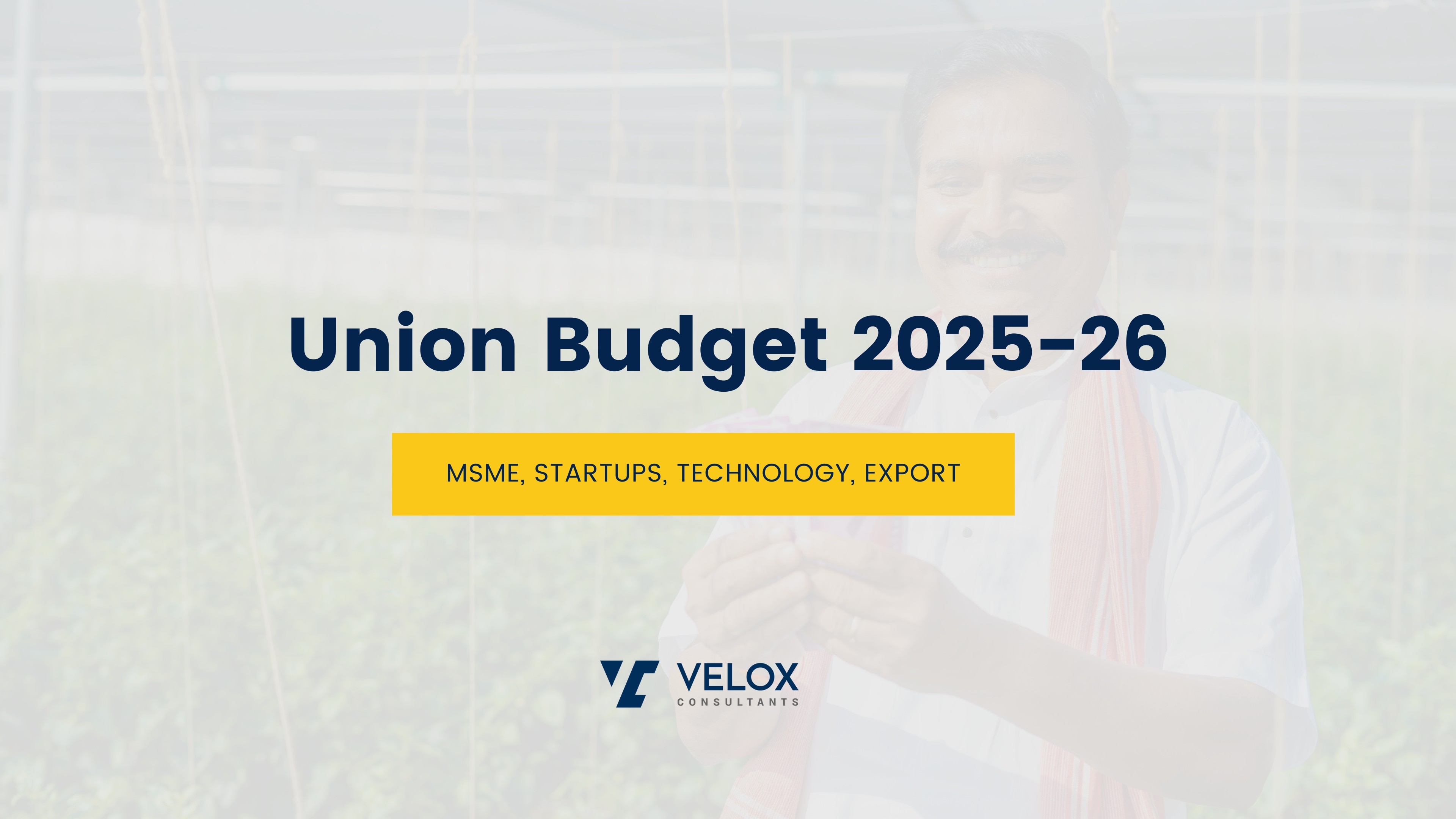Budget Overview
The Union Budget for 2025-26 intends to expedite economic growth with a significant emphasis on Micro, Small, and Medium Enterprises (MSMEs), startups, exports, and infrastructure development. Among the principal initiatives are the enhancement of credit accessibility for small enterprises, tax relief measures for the middle class, and the promoting of public-private partnerships to stimulate investment. The budget prioritizes clean energy, industries driven by artificial intelligence, and resilience within supply chains, fortifying pivotal sectors such as defense, pharmaceuticals, electronics, renewable energy, and agriculture. The budget establishes a robust foundation for sustained economic stability and self-reliance by strengthening financial inclusion and advancing digital transformation.
In alignment with Viksit Bharat's vision, the government underscores the importance of employment-driven development, innovation, and regional growth. Initiatives such as enhancing credit guarantees for MSMEs and startups, bolstering domestic manufacturing efforts under the Make in India initiative, and investing in green technology and research in artificial intelligence strategically position India as a formidable global economic entity. Additionally, the budget extends financial support for rural prosperity, skill development, and infrastructure modernization, ensuring inclusive growth while upholding fiscal responsibility.
MSME Update
- Higher Credit Availability for MSMEs and Startups: The Budget for the fiscal year 2025-26 significantly improves credit accessibility for small enterprises and startups by increasing the credit guarantee cover to ₹10 crores for Micro, Small, and Medium Enterprises (MSMEs) and ₹20 crores for startups. This initiative promotes easier access to capital and enhances the confidence of lenders. Furthermore, to assist micro-enterprises, a credit card limit of ₹5 lakh will be introduced for businesses registered under the Udyam scheme, thereby alleviating working capital constraints. Moreover, well-performing export-oriented MSMEs will receive the advantage of special term loan guarantees amounting to ₹20 crore, thereby ensuring their seamless integration into global trade networks.
- Revised MSME Classification: To support business expansion, the Budget for the fiscal year 2025-26 significantly increases the investment and turnover limits for Micro, Small, and Medium Enterprises (MSMEs) by a factor of 2.5. This adjustment permits expanding enterprises to maintain their MSME classification while benefiting from reduced interest rates, priority sector lending, subsidized technology adoption programs, and export tax exemptions. Such reforms are especially advantageous for export-driven and medium-scale industries, facilitating their ability to scale operations without forfeiting essential government support incentives.
- MSME Export Boost: Easier Credit and Global Integration: To enhance the competitiveness of Micro, Small, and Medium Enterprises (MSMEs) within global markets, the Budget for the fiscal year 2025-26 introduces measures to simplify access to export credit. This initiative seeks to alleviate compliance burdens and implement tariff reductions, thereby decreasing costs for MSMEs integrating into global supply chains. Additionally, the introduction of BharatTradeNet (BTN), a consolidated trade documentation platform, will facilitate the streamlining of cross-border transactions and financing. Furthermore, cross-border factoring support will ensure a smooth cash flow for exporters. These initiatives aim to facilitate the seamless integration of MSMEs into global value chains, particularly in electronics, renewable energy, and precision manufacturing engineering.
- New & Revamped MSME Schemes: The fiscal year 2025-26 budget introduces significant initiatives to support first-time entrepreneurs, street vendors, and high-growth startups. A new scheme will allocate term loans of ₹2 crore to 500,000 women entrepreneurs and those from the Scheduled Castes and Scheduled Tribes, inspired by the Stand-Up India initiative. This program will integrate financial assistance with online skill-building programs. Furthermore, the PM SVANidhi Scheme is revamped to implement increased loan limits for street vendors and nano-entrepreneurs, complemented by UPI-linked credit cards that will provide a credit limit of ₹30,000 to promote digital transactions. In addition, to stimulate growth in manufacturing and innovation within startups, the government will invest ₹10,000 crore into Alternate Investment Funds (AIFs) designated for startups. Moreover, a Deep Tech Fund of Funds will be established to spearhead advancements in artificial intelligence, biotechnology, and advanced technology manufacturing.
- MSME & Infrastructure Growth Initiatives: The Budget for the fiscal year 2025-26 announces the establishment of a ₹1 lakh crore Urban Challenge Fund aimed at financing urban infrastructure initiatives, thereby creating substantial growth opportunities for Micro, Small, and Medium Enterprises (MSMEs) in the sectors of construction, services, and logistics. Furthermore, a three-year Public-Private Partnership (PPP) model infrastructure pipeline will be implemented to bolster MSME clusters by enhancing logistics, warehousing, and transportation facilities. To further empower small businesses, the rural network of India Post will be utilized for MSME financing, order fulfillment, and logistics support in conjunction with expanding public logistics infrastructure, benefiting artisans, small manufacturers, and rural enterprises.
- Skill Development & MSME Workforce Training: The fiscal year 2025-26 budget emphasizes the importance of skill development by establishing five National Centres of Excellence dedicated to technical training. This initiative aligns with the objectives of the Make in India program, which aims to equip the workforce with skills relevant to the industry. Furthermore, the government plans to establish 50,000 Atal Tinkering Labs to promote STEM innovation among students, thereby nurturing future entrepreneurs and innovators. In addition, a dedicated Centre for Artificial Intelligence in Education will be implemented to enhance digital capabilities further, integrating AI and digital skills into training the Micro, Small, and Medium Enterprises (MSME) workforce, ensuring that businesses maintain competitiveness in the continuously evolving technological landscape.
- Strengthening MSME Digital & Financial Ecosystem: The fiscal year 2025-26 budget aims to fortify the digital public infrastructure for Micro, Small, and Medium Enterprises (MSMEs) through expanding IndiaStack and digital public goods. This initiative seeks to facilitate seamless business-to-business (B2B) and business-to-consumer (B2C) transactions, thereby promoting the growth of MSMEs. Furthermore, introducing a Grameen Credit Score System is anticipated to enhance financial inclusion for rural entrepreneurs, providing improved access to credit and formal financial services. To further bolster MSME financing, the government is set to establish a Partial Credit Enhancement Facility for corporate bonds, enabling MSMEs to raise funds more efficiently. Additionally, implementing simplified Know Your Customer (KYC) procedures is expected to streamline compliance efforts and enhance the ease of conducting business, effectively reducing bureaucratic obstacles for small enterprises.
Sectors
- Healthcare: The Budget for 2025-26 prioritizes the healthcare and pharmaceutical sectors by expanding medical education to include 10,000 new undergraduate and postgraduate seats and enhancing AI research within healthcare. Cancer care centers will be established in all districts, with 200 being set up this year. Furthermore, the government has announced tax exemptions on 36 life-saving drugs, including cancer treatments and rare diseases. Additionally, AI-driven research centers will facilitate drug discovery and diagnostics, strengthening India's healthcare ecosystem.
- Marine and Shipping: The ₹25,000 Crore Maritime Development Fund will catalyze growth in shipbuilding, ports, and logistics, enhancing India's maritime infrastructure. Establishing shipbuilding clusters and providing financial incentives will promote domestic manufacturing, supporting the Make in India initiative. Furthermore, the revamped UDAN Scheme will create 120 new airports and helipads, thus improving regional connectivity and increasing accessibility to remote areas. These initiatives aim to fortify India's transportation, logistics, and trade ecosystem, fostering economic expansion and industrial competitiveness.
- Agriculture and Food Processing: A National Institute of Food Technology, Entrepreneurship, and Management will be established in Bihar to drive innovation and growth in the food processing sector. This institute will enhance food processing capabilities by promoting advanced technologies, research, and skill development. Additionally, it will improve farm-to-market linkages, ensuring better value realization for farmers through enhanced logistics and processing infrastructure. The institute will also support micro, small, and medium enterprises (MSMEs) involved in agribusiness, providing access to training, funding, and market insights to bolster competitiveness and entrepreneurship in the sector.
- Toys and Industrial Products: India is solidifying its position as a global toy manufacturing hub through a cluster-based approach, promoting local, innovative, and sustainable production to minimize imports. The National Action Plan for Toys emphasizes domestic manufacturing, while incentives for leather and footwear production aim to increase employment. Moreover, the National Manufacturing Mission is poised to scale MSMEs and larger industries, reinforcing India’s Make in India vision and enhancing its global manufacturing competitiveness.
- Chemicals and Petrochemicals: Import duty exemptions on critical minerals and key raw materials are designed to enhance domestic manufacturing by securing cost-effective access to essential inputs and reducing import dependency. Concurrently, expanding petrochemical parks will bolster local production capabilities, promote exports, and attract investments in the downstream sector, thereby strengthening India's industrial ecosystem. These measures align with the government’s objective to foster self-reliance, stimulate economic growth, and position India as a global manufacturing hub.
- Defense and Aerospace: The Budget for 2025-26 emphasizes enhancing domestic defense manufacturing by awarding contracts to Defence Public Sector Undertakings (PSUs) and MSMEs under the Make in India initiative. Tax incentives for aerospace research and development and military technology startups to cultivate innovation will be offered. Furthermore, a special fund will be established to support research and development in drones, AI-based defense systems, and space technology to fortify India's strategic capabilities and self-reliance in the defense sector.
- Renewable Energy: The Budget for 2025-26 introduces a 100 GW Nuclear Energy Mission, allocating ₹20,000 crore for small modular reactors (SMRs). Additionally, the Clean Tech Mission supports the expansion of solar, wind, and battery manufacturing. Subsidies will enhance electric vehicle (EV) adoption, battery storage, and hydrogen energy projects, thus fostering India's transition to clean energy. These measures aim to improve energy security, reduce carbon emissions, and position India as a global leader in sustainable energy development.
- Electronics and Semiconductors: The Indian government has announced a Deep Tech Fund to accelerate the growth of next-generation artificial intelligence, semiconductor manufacturing, and quantum computing. Additionally, incentives for semiconductor manufacturing will be expanded to enhance domestic production and reduce import reliance. In further support of the electronics industry, the government is reducing import duties on essential components for mobile and electric vehicle (EV) manufacturing, making local production more competitive and promoting innovation in high-tech sectors.
- Infrastructure and Urban Development: The Government of India has announced an Urban Challenge Fund amounting to ₹1 Lakh crore, aimed at stimulating the development of modern cities. It also intends to expand public-private partnerships (PPPs) for metro rail projects, smart cities, and highways to enhance infrastructure. Furthermore, the government plans to ensure comprehensive broadband coverage in government schools and primary healthcare centers, thereby improving digital access to education and healthcare services. These initiatives align with the broader objective of urban transformation, infrastructure development, and digital inclusion throughout India.
- Mining and Rare Earth: To strengthen domestic supply chains and diminish dependency on imports, a new policy regarding the extraction and refining of critical minerals will be implemented. In support of processing and job creation, the government has granted a complete exemption from customs duties on cobalt powder, lithium-ion battery scrap, lead, zinc, and twelve other critical minerals, ensuring their availability for industrial applications. Furthermore, a policy to recover critical minerals from tailings will be enacted to optimize resource utilization and advance sustainable mining practices.
- Textiles & Apparel: To enhance the technical textiles sector, the government has permitted the duty-free importation of two additional types of shuttle-less looms, thereby supporting agro-textiles, medical textiles, and geo-textiles. Furthermore, the Mission for Cotton Productivity, a five-year initiative, seeks to improve cotton farming productivity and encourage the cultivation of extra-long staple cotton varieties to yield higher-quality output. In the footwear and leather industry, a specialized focus product scheme is designed to stimulate substantial growth, projected to generate ₹4 lakh crore in turnover, create 22 lakh jobs, and elevate ₹1.1 lakh crore in exports, thus fortifying India's position in the global marketplace market.
- Education: The Bharatiya Bhasha Pustak Scheme aims to provide digital books in various Indian languages to enhance the learning experiences for students in both school and higher education. To promote technological advancements, a Centre of Excellence in Artificial Intelligence for Education, with an allocated budget of ₹500 crore, will be established. Furthermore, the government is expanding the Indian Institutes of Technology (IITs) by adding 6,500 new student seats across five institutes while upgrading the hostel and infrastructural facilities at IIT Patna. In medical education, an additional 10,000 seats will be introduced in the academic year 2025-26, with a long-term objective of adding 75,000 seats over the next five years to address the increasing demands of the healthcare sector. Additionally, 50,000 Atal Tinkering Labs in government schools will be established to foster innovation and stimulate scientific curiosity among students.
- Tourism and Medical Travel: To enhance India's tourism sector, fifty premier tourist destinations will be developed in collaboration with the respective states, utilizing a challenge mode approach. The government will implement visa waivers alongside a streamlined electronic visa process to attract more international visitors. Furthermore, MUDRA loans will be allocated to support homestay businesses, bolster local tourism, and enhance employment opportunities. An Urban Challenge Fund amounting to ₹10,000 crore has been designated to augment urban tourism infrastructure. Additionally, the "Heal in India" initiative seeks to establish India as a global hub for medical tourism by facilitating visa regulations and fortifying healthcare infrastructure for international patients.
Export
The Government of India has announced significant initiatives to augment exports and optimize trade documentation processes. The BharatTradeNet platform will digitalize international trade documentation, enhancing transparency and efficiency. An Export Promotion Mission will incentivize Micro, Small, and Medium Enterprises (MSMEs), fostering their integration into global supply chains. The priority sectors encompass electronics, chemicals, textiles, food processing, and pharmaceuticals. Furthermore, the warehousing infrastructure for air cargo will be enhanced to facilitate agricultural and seafood exports, consequently improving cold chain logistics.
- BharatTradeNet & Export Promotion Mission: BharatTradeNet will be a digital public infrastructure to streamline international trade documentation and financing processes. The Export Promotion Mission will be jointly overseen by the Ministries of Commerce, Micro, Small and Medium Enterprises (MSME), and Finance. MSMEs account for 45% of India's total exports. MSMEs’ investment and turnover thresholds will be increased by 2.5 times and 2 times, respectively, to enhance their global competitiveness. The credit guarantee cover for MSMEs will be expanded as follows: From ₹5 crore to ₹10 crores for Micro and Small Enterprises, facilitating an additional credit infusion of ₹1.5 lakh crore over five years, from ₹10 crore to ₹20 crore for startups operating within 27 focus sectors. Furthermore, term loans for exporting MSMEs will receive credit coverage of up to ₹20 crore crore.
- Sectoral Focus for Exports: The government prioritizes key industries with strategic initiatives to drive growth and innovation. The domestic electronics equipment industry will receive support to facilitate its integration with Industry 4.0. A ₹5,000 crore allocation under the Mission for Cotton Productivity aims to enhance productivity and quality in textiles. The food processing sector will see the establishment of a National Institute of Food Technology in Bihar. At the same time, the pharmaceuticals industry will benefit from a ₹500 crore investment in a Centre of Excellence for Artificial Intelligence in healthcare. Additionally, the chemicals sector will gain from reduced import duties on essential raw materials, strengthening industry performance and boosting exports.
- Air Cargo Warehousing & Logistics: The export of seafood annually contributes ₹60,000 crore to the Indian economy. To enhance logistics, greenfield airports will be established in Bihar. The expansion of the UDAN scheme encompasses an increase from 619 routes to an additional 120 destinations, with the expectation of accommodating four crore passengers over the next decade. Furthermore, cargo screening and customs protocols will be optimized to facilitate the swift export of perishable goods, including horticulture and seafood.
Technology
The fiscal year 2025-2026 budget significantly emphasizes transforming Micro, Small, and Medium Enterprises (MSMEs) towards Industry 4.0 by providing incentives to foster advancements in artificial intelligence, automation, and smart manufacturing technologies. The National Manufacturing Mission aims to improve the ease of doing business, facilitate digital adoption, and enhance workforce readiness, all while streamlining regulatory processes. An allocation of ₹20,000 Crores has been designated for investments in artificial intelligence, Internet of Things (IoT), and automation within the manufacturing sector. Additionally, 50,000 Atal Tinkering Labs will be established to promote Science, Technology, Engineering, and Mathematics (STEM) education. Tax benefits and various financial incentives are intended to support the adoption of clean technologies, thereby encouraging domestic production of solar photovoltaic cells, electric vehicle batteries, electrolyzers, wind turbines, and high-voltage grid equipment. Furthermore, the National Geospatial Mission is set to enhance precision agriculture and bolster defense capabilities, thus advancing India’s digital and industrial infrastructure.
Startups
The government has officially announced significant initiatives to enhance India's startup ecosystem. A Fund of Funds amounting to ₹10,000 Crores will be established to support Alternate Investment Funds (AIFs) that allocate resources to startups. Furthermore, a specialized credit scheme will provide term loans of ₹2 Crores to 500,000 entrepreneurs, specifically targeting first-time SC/ST/Women-led ventures over five years. Additionally, establishing a Deep Tech Fund of Funds is under consideration, intended to expedite the growth of startups in artificial intelligence, space technology, and quantum computing. Moreover, the tax benefits for startups have been extended through the year 2030, thereby ensuring sustained incentives for emerging ventures.
Key Points:
- A ₹10,000 crore Fund of Funds designated for the financing of startups.
- Provision of term loans amounting to ₹2 crore for 500,000 SC/ST and women entrepreneurs.
- Establishment of a Deep Tech Fund to support startups in artificial intelligence, space technology, and quantum computing.
- Extension of startup tax benefits until the year 2030.
Our Perspective
The most recent budget is oriented towards growth, significantly emphasizing manufacturing, exports, and the digital economy. It aims to strengthen Micro, Small, and Medium Enterprises (MSMEs) and startups through enhanced funding, credit support, and tax relief measures. A pronounced focus is given to technology-driven sectors, such as artificial intelligence, semiconductors, and Industry 4.0, in conjunction with an initiative towards sustainability in renewable energy and green manufacturing. Furthermore, the budget advocates for social inclusion by empowering women, Scheduled Castes/Scheduled Tribes (SC/ST) entrepreneurs, and gig workers, thereby promoting a business environment that is both progressive and inclusive.
At Velox Consultants, we enable enterprises to harness these opportunities by integrating real-time market intelligence, insights driven by artificial intelligence, and strategic frameworks that enhance operational efficiency and promote sustainable growth. Through VeloData Insights, organizations acquire access to policy updates, industry trends, competitor strategies, and investment insights, ensuring their agility in a rapidly changing landscape. Our Design Matrix facilitates strategy-driven expansion, while our Corporate Innovation Program fosters research collaborations and disruptive innovations, effectively positioning firms for enduring success. Whether navigating policy changes, scaling operations, or adopting advanced technologies, Velox Consultants equips your business with the necessary expertise and tools to thrive in a dynamic economic environment.
Contact us at consult@veloxconsultants.com to explore customized market intelligence solutions and gain exclusive insights that drive innovation, competitiveness, and sustainable growth.





